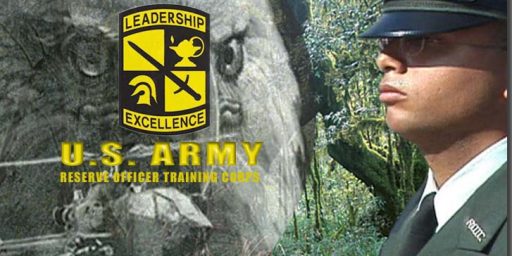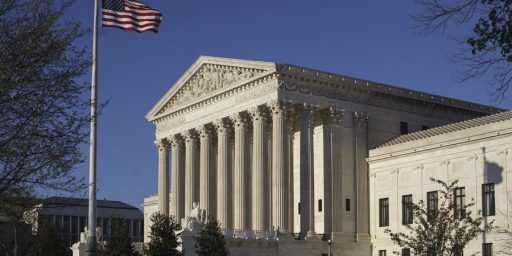ELITES AND THE MILITARY
Christina Hoff Sommers revisits a recurring theme in a WaPo op-ed today: the lack of ROTC programs at many elite private colleges and universities.
America’s elite schools tend to regard the military as morally suspect. Students soon get the message that a career in the armed forces is unworthy of their consideration.
The distaste of top-tier schools for the military is powerfully demonstrated when faculties deny the Reserve Officer Training Core (ROTC) access to the campus. Harvard, Yale, Stanford, Brown and Columbia, for example, have not allowed it in 30 years.
The ban discourages some of the country’s best students from volunteering for military service. The nation, in turn, is deprived of their skills, talent and imagination.
True. Of course, if one wishes to pursue a career in the military and can get into Harvard, one would presumably be sufficiently intelligent to apply and be accepted elsewhere. And Harvard students can take ROTC courses at M.I.T.
At some of our top-ranked universities, patriotism itself is disdained. According to University of Chicago ethics professor Martha Nussbaum, “pride in a specifically American identity” is “morally dangerous.” Barton Bernstein, a Stanford professor of history, speaks for many of his peers when he reproaches ROTC for “preparing students for war and training them to kill, and that is fundamentally unacceptable at a university.” Cecilia Ridgeway, a sociologist and member of the Stanford Faculty Senate, adds that “first-rate universities” should not feed “militaristic approaches to problems.” Nussbaum, Bernstein and Ridgeway seem unimpressed by the fact that the free and democratic way of life Americans enjoy is ultimately protected by an effective military.
These professors and those who agree with them may be far outside the mainstream of American opinion, but on campus they have the power to make life difficult for undergraduates who wish to prepare to serve their country.
Again, this is hardly news.
Hoff’s suggestion for how to get around all this seems reasonable, however:
In the mid-1990s a law was enacted that prohibits colleges and universities from receiving federal funds if they fail to permit military recruiters or ROTC units on campus.
Subsequent revisions and clarifications of the original provision, known as the Solomon Amendment, have strengthened it to stipulate that if any school within a university denies access to recruiters or bans ROTC, the entire institution could lose its federal funding.
The Air Force recently used the Solomon Amendment to gain access to law school job fairs. Until last year, many law schools barred military recruiters from their campuses. But the Air Force sent them letters warning them that by blacklisting the military, they were violating the law and risked losing all government subsidies. Law professors were apoplectic. There were frantic meetings, rallies and threats of lawsuits. Protesters disrupted Air Force interviews with students. “It’s essentially blackmail,” said a stunned Harvard Law professor, Heather Gerken. But law schools such as Harvard, Yale, Stanford and Georgetown have quietly complied.
What worked for the law schools will work for liberal arts colleges. They should be presented with the choice of lifting the ban on ROTC or losing government support.
This seems like a reasonable compromise. There are hundreds of institutions of higher learning in the U.S., a large number of which offer ROTC. There’s no reason for the taxpayers to subsidize private schools that don’t support the program.






The problem with not allowing ROTC on campus isn’t so much about recruiting kids, but rather, seeing ROTC and the military as an acceptable part of society. That is what makes some Harvard Law professors apopleptic.
Needless to say, I’m sure all of those campuses most likely host other groups to encourage acceptance and diversity. *ahem*
Yep. Diverse means either “weird” or “black” to these guys. The values of middle America are what diversity is supposed to counteract.
You couldn’t be more wrong–and in many ways.
Most offensively, this isn’t an issue of patriotism; it’s an issue of discrimination. Why on earth should a private school–one which is committed to non-discrimination–be compelled to offer a program which discriminates against some of its students?
Next, Hoff is wrong when she claims the lack of an ROTC discourages students from volunteering for the military. It’s a red herring; nothing discourages those who have a desire to join up.
Hoff also tries to muddy the issue by making it seem as if various Ivy law schools are receiving huge Govt. subsidies–they aren’t. The undergrad schools may be and they do have ROTC programs.
No, this is just another conservative-wrapped-in-the-flag swipe at those nasty old liberal schools. Why do I get the feeling that Ms. Hoff and her sycophants would be upset if various rightwing religious schools were required to make admissions based on equal opportunity or access in order to keep their subsidies?
Guy: Why do I get the feeling that Ms. Hoff and her sycophants would be upset if various rightwing religious schools were required to make admissions based on equal opportunity or access in order to keep their subsidies?
But they are.
While I agree that there are avenues to joining the military for those who start off with that desire–and indeed make that point in the post–it is also true that having a culture that’s anti-military in the schools has a chilling effect.
I suspect the Ivies get along mainly on their endowments and alumni contributions but, obviously, there is a substantial inflex from federal research grants and loan guarantees.
The anti-gay discrimination issue is a red herring. The schools that dropped ROTC almost all did so before the Ivies started caring about such things.
But they are.
Fine, try getting into Regent University School of Law being either non-Christian and/or pro-choice. Best of luck to you.
While I agree that there are avenues to joining the military for those who start off with that desire–and indeed make that point in the post–it is also true that having a culture that’s anti-military in the schools has a chilling effect.
Untrue. As much as you wish this were the case, it simply isn’t so. I can provide a bit of anecdotal evidence, if you wish, having graduated from a federal military academy; I can attest to the fact I was always treated with respect and, I might add, friendliness and curiosity about my experiences and views.
Again, if one wishes to serve and one wishes to get the best education–it is childsplay to do so.
The anti-gay discrimination issue is a red herring. The schools that dropped ROTC almost all did so before the Ivies started caring about such things.
ROTC was dropped in the 60s as a byproduct of dissent over the Vietnam war. Subsequently, gay rights became the issue. As I’m sure you’re aware, gay rights didn’t really exist as an issue anywhere prior to the Stonewall uprising in 1969.
Actually, military recruiters are already using the law to get space at college and university career fairs and interview positions to attract job candidates. There was some serious hand-wringing about this in the academic community (and on NPR) last May, I believe.
—